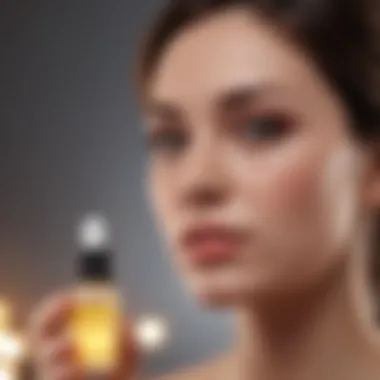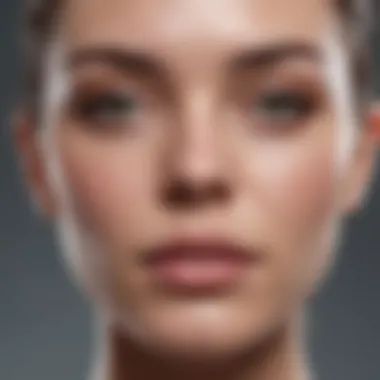Effective Ways to Remove Pimples: A Comprehensive Guide for Clear Skin


Fashion Trends
When it comes to effective ways to remove pimples and achieve clear skin, focusing on lifestyle changes and skincare routines is crucial. Understanding the needs of your skin type plays a pivotal role in combating those pesky pimples for good. Whether you are drawn to the latest fashion trends or prefer classic styles, ensuring your skin is clear can boost your overall appearance and confidence.
Dating Tips
Taking care of your skin is not just about looking good; it's also about feeling good. Incorporating skincare practices into your daily routine can enhance your self-care rituals and potentially improve your dating experiences. From online dating profile pictures to preparing for a first date, clear skin can speak volumes about your self-care habits and attention to detail.
Inspiration and Style Tips
Clear, radiant skin is the ultimate accessory to any outfit. By following skincare routines tailored to your skin type and embracing lifestyle changes that support skin health, you can showcase a glowing complexion effortlessly. Drawing inspiration from celebrities who prioritize skincare can offer valuable insights into maintaining clear skin while staying stylish and on-trend.
Understanding Pimples
In the realm of skincare, comprehending pimples is fundamental to devising effective treatment strategies. Understanding the root causes behind acne breakouts can immensely aid individuals in combatting these pesky blemishes. By delving into the intricacies of pimples, one can tailor their skincare routine to address these issues head-on, promoting clearer and healthier skin. This section serves as a valuable introduction to the complex world of acne and sets the stage for exploring various solutions to banish pimples for good.
What Are Pimples?
Definition of Pimples
Pimples, medically referred to as acne vulgaris, are skin lesions that occur when hair follicles become clogged with oil and dead skin cells. Understanding the definition of pimples is crucial as it lays the foundation for addressing acne-related concerns systematically. The distinctive feature of pimples lies in their varied manifestations, encompassing whiteheads, blackheads, papules, pustules, nodules, and cysts. Exploring the nuances of pimple formation enables individuals to identify specific acne types accurately, facilitating targeted treatment approaches tailored to individual skin needs.
Causes of Pimples
The causes of pimples are multifaceted, ranging from hormonal fluctuations to genetic predispositions and environmental factors. Identifying the diverse triggers that contribute to pimple formation elucidates the importance of adopting a holistic approach to skincare. Factors such as excessive sebum production, bacterial overgrowth, and inflammation play pivotal roles in the development of acne. Unraveling the underlying causes of pimples equips individuals with insights to mitigate acne triggers effectively, fostering clearer and healthier skin in the long run.
Types of Pimples
Acne encompasses a spectrum of blemishes, each with unique characteristics and implications for skincare regimens. Whiteheads and blackheads are non-inflammatory lesions that result from clogged pores, while papules and pustules signify inflammatory acne typified by redness and swelling. Nodules and cysts represent severe forms of acne that require expert intervention for management. Understanding the distinct types of pimples empowers individuals to differentiate between varying acne presentations and select suitable treatment modalities tailored to their specific skin concerns.
Why Do Pimples Form?
Factors Contributing to Pimple Formation
Pimple formation is influenced by a myriad of factors, including excess sebum production, bacteria accumulation, and skin inflammation. Exploring the factors contributing to pimple formation sheds light on the intricate interplay of internal and external elements that can exacerbate acne. By recognizing the role of these factors in acne development, individuals can adopt targeted skincare practices to address underlying causes and prevent future breakouts.
Role of Hormones
Hormonal fluctuations, particularly during puberty or menstruation, can trigger acne flare-ups by stimulating oil production in the skin. Understanding the impact of hormones on acne development elucidates the cyclical nature of breakouts and emphasizes the importance of hormone regulation in controlling pimple formation. Hormonally induced acne requires tailored skincare approaches that aim to harmonize hormonal imbalances and minimize the risk of persistent breakouts.
Impact of Genetics
Genetic predispositions can significantly influence an individual's susceptibility to acne, shaping their skin's response to various environmental stimuli. Investigating the impact of genetics on acne empowers individuals to discern inherited factors that may predispose them to certain types of acne. Recognizing the role of genetics in acne pathogenesis enables personalized skincare interventions that target specific genetic markers associated with acne susceptibility, promoting clearer and more resilient skin over time.
Preventive Measures
In the realm of combating pimples, preventive measures play a paramount role in ensuring clear and healthy skin. By incorporating effective preventive strategies, individuals can proactively address pimple formation before it becomes a prominent concern. This section delves into the significance of preventive measures, shedding light on the importance of adopting a proactive approach towards skincare. Implementing preventive measures not only aids in averting pimple outbreaks but also contributes to overall skin health.
Developing a Healthy Skincare Routine
Choosing the Right Cleanser
When considering a healthy skincare routine, selecting the appropriate cleanser stands out as a foundational step. The choice of cleanser can significantly impact skin health by clearing pores, removing impurities, and maintaining the skin's natural balance. Emphasizing the selection of a gentle yet effective cleanser is crucial in preventing pimple formation. The right cleanser should cater to specific skin types and concerns, promoting a rejuvenated and clean complexion.


Importance of Moisturizing
An often overlooked aspect of skincare, moisturizing plays a pivotal role in maintaining skin hydration and barrier function. Proper moisturization aids in preventing excessive sebum production, a common trigger for pimples. Embracing a suitable moisturizer tailored to individual skin needs can enhance skin texture, elasticity, and overall health. Moisturizing regularly contributes to a balanced complexion and diminishes the likelihood of acne development.
Sun Protection Essentials
Incorporating sun protection essentials into a skincare regimen is vital for shielding the skin from harmful UV rays and environmental stressors. Sunscreen not only prevents sun damage and premature aging but also safeguards against inflammatory responses that can exacerbate acne. Choosing a broad-spectrum sunscreen with adequate SPF levels is essential in safeguarding skin health. Sun protection essentials ensure comprehensive care for the skin, promoting a radiant complexion while mitigating potential pimple triggers.
Dietary Adjustments
Impact of Diet on Skin Health
The correlation between diet and skin health underscores the significance of mindful nutritional choices in pimple prevention. Consuming a balanced diet rich in vitamins, minerals, and antioxidants nurtures skin vitality from within. A diet focusing on whole foods and limiting processed sugars and greasy fare can positively influence skin clarity and resilience. Addressing dietary concerns can alleviate skin inflammations and create an environment conducive to clear, blemish-free skin.
Foods to Avoid
Identification of problematic foods is imperative in curating a diet supportive of skin wellness. Certain foods, such as high glycemic index items, dairy, and processed snacks, have been linked to pimple exacerbation. By steering clear of these culprits and opting for skin-friendly alternatives, individuals can complement their skincare routines effectively. Exercising dietary mindfulness empowers individuals to make informed choices that promote optimal skin conditions.
Nutrients for Clear Skin
Optimizing nutrient intake for skin health entails focusing on key vitamins like A, C, and E, along with minerals such as zinc and selenium. These nutrients possess antioxidant properties and support various skin functions, aiding in pimple prevention and skin regeneration. Incorporating nutrient-dense foods like fruits, vegetables, and lean proteins bolsters skin resilience and luminosity. Prioritizing clear-skin-promoting nutrients enhances overall skin vitality and combats pimple formation effectively.
Stress Management
Effects of Stress on Skin
The impact of stress on skin is a significant aspect that influences pimple development and skin quality. Elevated stress levels trigger hormonal imbalances and inflammation, culminating in skin breakouts. By understanding the detrimental effects of stress on skin health, individuals can adopt strategies to mitigate these impacts effectively. Stress management is pivotal in achieving skin equilibrium and thwarting stress-induced pimple flare-ups.
Relaxation Techniques
Incorporating relaxation techniques into daily routines serves as a potent tool in combating stress-related skin issues. Practices like deep breathing, meditation, and mindfulness promote inner calm and reduce cortisol levels, mitigating skin inflammations. Enhancing relaxation techniques cultivates a serene mindset and aids in maintaining skin harmony, countering the adverse effects of stress on skin health. Embracing relaxation practices fosters a holistic approach to managing stress and promoting clear, radiant skin.
Incorporating Exercise
Engaging in regular physical activity is a beneficial endeavor for both overall well-being and skin health. Exercise stimulates blood circulation, promotes detoxification, and enhances oxygen flow to skin cells, fostering a vibrant complexion. The positive impact of exercise on stress reduction and endorphin release further contributes to skin clarity and resilience. By integrating exercise into daily routines, individuals bolster their skin's natural defenses against pimple formation, paving the way for improved skin health and vitality.
Topical Treatments
In this article, the section on Topical Treatments delves into essential methodologies for combating pesky pimples directly on the skin's surface. Topical treatments play a pivotal role in addressing various forms of acne, offering targeted solutions with topical applications. These treatments are beneficial for individuals looking to manage mild to moderate acne without resorting to oral medication or invasive procedures.
Over-the-Counter Options
When exploring Over-the-Counter Options, it is crucial to consider key ingredients that play a significant role in the effectiveness of topical treatments. Ingredients like benzoyl peroxide, salicylic acid, and sulfur are renowned for their acne-fighting properties, penetrating the pores to unclog and reduce inflammation. These ingredients are carefully selected for their ability to combat acne-causing bacteria, control sebum production, and promote skin turnover.
Key Ingredients to Look For
The presence of benzoyl peroxide in over-the-counter treatments is highly favored due to its potent antibacterial properties, targeting the root cause of acne formation. Salicylic acid, on the other hand, exfoliates the skin, removing dead cells and preventing pore blockages. Sulfur is known for its antimicrobial and anti-inflammatory properties, making it an effective choice for combating acne while minimizing irritation and redness.
Best Practices for Application
Applying over-the-counter treatments correctly is essential for optimal results. It is recommended to start with clean, dry skin and apply a thin layer of the product evenly over the affected areas. Avoid over-application, as it can lead to excessive dryness or irritation. Consistency in application, usually once or twice daily as directed, is key to seeing improvements in the skin's condition.
Monitoring Progress


Regularly assessing the skin's response to over-the-counter treatments is vital for tracking progress and making necessary adjustments. Patience is essential, as visible improvements may take several weeks to manifest. Monitoring for any adverse reactions or unexpected results is crucial to ensuring the chosen treatment remains suitable and effective for individual skin needs.
Prescription Solutions
For more severe or persistent acne concerns, Prescription Solutions offer advanced medical interventions under the supervision of a dermatologist. Consulting a dermatologist provides customized treatment plans tailored to specific skin issues, ensuring a comprehensive and personalized approach to acne management.
Consulting a Dermatologist
Drawing on the expertise of a dermatologist allows for a more in-depth assessment of skin conditions and overall health factors contributing to acne. Dermatologists can offer professional insight, recommend suitable prescriptions or procedures, and monitor progress closely to achieve optimal results in acne treatment.
Treatment Options
Prescription treatments, such as topical retinoids, oral antibiotics, or hormonal medications, are prescribed based on the severity and type of acne. These options target underlying causes of acne, such as excessive oil production, hormonal imbalances, or inflammation, tackling the issue from within the skin layers for lasting improvements.
Follow-up Care
Post-treatment care and follow-up appointments with the dermatologist are essential components of prescription solutions for acne. Monitoring the skin's response to specific medications, adjusting dosages as needed, and addressing any concerns or side effects ensure the treatment plan remains effective and suits the individual's evolving skin needs.
Home Remedies
In the realm of effective ways to eliminate pimples, home remedies play a pivotal role. They offer natural solutions that are gentle on the skin and often easily accessible. Home remedies have been cherished for centuries for their efficacy in addressing various skin concerns, including pimples. In this article, we delve into the significance of integrating home remedies into your skincare routine to combat pesky pimples successfully. These remedies provide a holistic approach that aligns with the body's natural processes, promoting long-term skin health and vitality.
Natural Ingredients
Tea Tree Oil
Tea tree oil, renowned for its antiseptic properties, is a key player in pimple treatment. This natural ingredient possesses antimicrobial and anti-inflammatory qualities that aid in reducing redness and swelling associated with pimples. Its effective antibacterial properties target the bacteria that contribute to acne formation, making it a popular choice for combating breakouts. Despite its potency, tea tree oil can sometimes cause skin dryness, necessitating cautious use within this comprehensive guide.
Aloe Vera Gel
Aloe vera gel, extracted from the aloe plant, is celebrated for its soothing and moisturizing effects on the skin. Its gentle nature makes it an ideal candidate for alleviating pimple-related inflammation and promoting healing. Rich in vitamins and antioxidants, aloe vera gel aids in calming irritated skin while supporting the skin's natural regeneration process. Its hydrating properties contribute to maintaining skin balance, making it a beneficial inclusion in the pursuit of clear skin.
Honey and Cinnamon Mask
The honey and cinnamon mask combines the antibacterial properties of honey with the anti-inflammatory characteristics of cinnamon to create a potent treatment for pimples. This mask helps in fighting acne-causing bacteria while reducing inflammation and redness, leading to clearer and calmer skin. Honey's moisturizing properties complement the soothing effects of cinnamon, offering a holistic approach to tackle pimples effectively. While this mask is widely favored for its natural origins, individual skin sensitivity should be considered when incorporating it into a skincare routine.
DIY Face Masks
Turmeric and Besan Mask
The turmeric and besan mask is a traditional remedy known for its brightening and anti-inflammatory effects. Turmeric's antibacterial properties help in combating acne, while besan (gram flour) gently exfoliates the skin, promoting a smoother complexion. This mask is particularly beneficial for individuals dealing with post-acne marks, assisting in rejuvenating the skin and fading stubborn scars. However, due to turmeric's staining potential and besan's exfoliating nature, patch testing and moderation are crucial when using this mask.
Oatmeal and Yogurt Mask
The oatmeal and yogurt mask offers a gentle yet effective solution for pimple-prone skin. Oatmeal's soothing properties calm irritation and inflammation, making it suitable for sensitive skin types. Combined with the probiotics and lactic acid in yogurt, this mask helps in balancing the skin's microbiome and reducing acne symptoms. Regular use of this mask can result in smoother, more nourished skin, emphasizing the importance of incorporating natural remedies into skincare rituals.
Apple Cider Vinegar Toner
The apple cider vinegar toner serves as a natural astringent with antibacterial properties that assist in combating acne-causing bacteria and excessive oil production. Its acidic p H helps in balancing the skin's mantle and maintaining a healthy skin barrier. Apple cider vinegar's exfoliating properties promote cell turnover, revealing a brighter complexion over time. While beneficial, its high acidity requires dilution to prevent skin irritation, highlighting the need for careful formulation when using this toner within a skincare regimen.
Professional Treatments
In the realm of skincare, professional treatments play a crucial role in combating stubborn pimples and achieving clear, healthy skin. These treatments, administered by trained experts, offer advanced solutions beyond what over-the-counter products can provide. Seeking professional help for persistent acne issues can significantly transform your skin condition and boost your confidence. Professional treatments encompass a range of procedures tailored to individual skin needs, ensuring personalized care and effective results.


Dermatological Procedures
Chemical Peels
Chemical peels are a highly sought-after dermatological procedure known for their ability to exfoliate the skin and address various skin concerns, including acne. The key characteristic of chemical peels lies in their ability to remove dead skin cells, unclog pores, and stimulate new skin cell growth, resulting in clearer, smoother skin. This treatment is popular for its efficacy in improving skin texture, tone, and overall appearance. While chemical peels come with advantages such as reducing acne scars and hyperpigmentation, they may also carry the risk of skin irritation or sensitivity in some individuals.
Microdermabrasion
Microdermabrasion is a non-invasive procedure that exfoliates the top layer of the skin, revealing a fresh layer underneath. This treatment is favored for its ability to unclog pores, reduce acne breakouts, and enhance skin clarity. The key characteristic of microdermabrasion is its gentle yet effective exfoliation process, making it suitable for various skin types. Microdermabrasion is a popular choice for individuals seeking to improve skin texture, reduce fine lines, and achieve a more radiant complexion. However, it may not be suitable for those with certain skin conditions or sensitivities.
Laser Therapy
Laser therapy is a cutting-edge dermatological procedure that utilizes focused light energy to target acne-causing bacteria and reduce inflammation. The key characteristic of laser therapy is its precision in destroying acne-causing bacteria while promoting collagen production for smoother skin. This treatment is renowned for its effectiveness in treating moderate to severe acne, including cystic acne. While laser therapy offers benefits like minimal downtime and long-lasting results, it may also pose rare risks such as temporary redness or swelling. Choosing the right dermatological procedure depends on individual skin concerns and goals.
Clinical Skincare Services
Facials
Facials are a popular clinical skincare service that involves deep cleansing, exfoliation, and hydration of the skin. The key characteristic of facials is their ability to unclog pores, remove impurities, and nourish the skin for a revitalized complexion. This skincare service is favored for its relaxing experience and immediate skin brightening effects. Facials can be customized to target specific skin concerns such as acne, dryness, or aging, making them suitable for a wide range of skin types. While facials offer benefits like improved skin texture and enhanced relaxation, they may require recurring sessions for sustained results.
Extractions
Extractions are a skincare technique performed during facials or professional treatments to remove blackheads, whiteheads, and other debris from the pores. The key characteristic of extractions lies in their ability to clear congested pores and prevent acne breakouts. This technique is popular for promoting clearer, smoother skin by eliminating pore blockages and impurities. While extractions can effectively improve skin clarity and prevent acne lesions, improper technique or overzealous extraction can lead to skin irritation or damage.
LED Light Therapy
LED light therapy is an innovative clinical skincare service that uses various wavelengths of light to target specific skin concerns, including acne. The key characteristic of LED light therapy is its ability to reduce acne-causing bacteria, calm inflammation, and promote skin healing. This non-invasive treatment is favored for its gentle yet effective approach to treating acne, making it suitable for sensitive skin. LED light therapy offers benefits such as minimal discomfort, no downtime, and gradual yet noticeable improvement in skin texture and tone. However, results may vary depending on individual skin response and consistency of treatments.
Section 6: Lifestyle Habits
Lifestyle habits play a crucial role in maintaining clear skin and preventing the formation of pimples. By incorporating healthy practices into your daily routine, you can promote skin health and overall well-being. From adequate sleep to proper hygiene, these habits can significantly impact the condition of your skin.
Sleep Hygiene
Impact of Sleep on Skin
Quality sleep is essential for skin health as it allows the body to repair and regenerate skin cells during the night. Lack of sleep can lead to increased stress levels and hormonal imbalances, which may trigger pimple formation. Ensuring a consistent sleep schedule can improve skin vitality and reduce inflammation, contributing to a clearer complexion.
Establishing a Night Routine
Establishing a night routine involves cleansing the skin, applying suitable skincare products, and relaxing before bedtime. Developing a consistent routine helps regulate oil production, prevents clogged pores, and promotes cell turnover. By incorporating nourishing serums and moisturizers, you provide essential nutrients to the skin overnight, aiding in repair and rejuvenation.
Benefits of Silk Pillowcases
Silk pillowcases offer numerous benefits for skin health. They are gentle on the skin, reducing friction and preventing creases and wrinkles. Silk is also hypoallergenic and breathable, promoting better air circulation while you sleep. Additionally, silk's smooth texture helps prevent hair breakage and maintain moisture balance, contributing to overall skin comfort.
Hygiene Practices
Maintaining proper hygiene practices is essential for preventing pimple breakouts and promoting skin clarity. Simple habits like cleaning makeup brushes, avoiding touching the face, and changing pillowcases regularly can make a significant difference in your skin's condition.
Cleaning Makeup Brushes
Regularly cleaning makeup brushes removes built-up product residue and bacteria, reducing the risk of skin irritation and breakouts. Clean brushes ensure smooth application and prevent the transfer of dirt and oils onto the skin. By incorporating brush cleaning into your beauty routine, you support skin health and longevity.
Avoiding Touching the Face
Touching the face transfers bacteria, dirt, and oils from your hands onto the skin, potentially leading to clogged pores and breakouts. Avoiding touching your face helps minimize skin irritation and promotes a healthier complexion. Practicing mindfulness and keeping hands clean can prevent the spread of harmful substances that contribute to pimple formation.
Changing Pillowcases Regularly
Changing pillowcases regularly is important for preventing the accumulation of oils, dirt, and bacteria that can transfer to your skin while you sleep. Clean pillowcases reduce the risk of pore blockages and skin irritation, contributing to clearer and healthier skin. Opting for soft, breathable fabrics like cotton can further enhance skin comfort and reduce the likelihood of breakouts.



